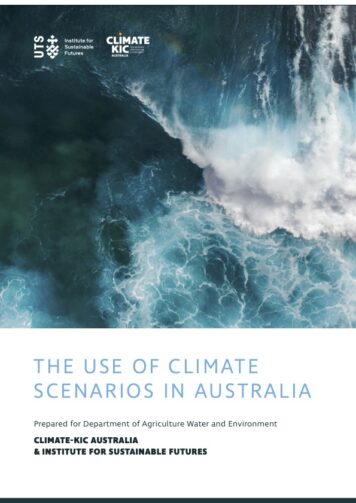16 August 2021, Sydney – In order to make assessments of the future, increasingly more organisations and businesses are looking to ‘scenario planning’, in which available data informs a series of possible outcomes (‘scenarios’). Climate scenarios are becoming more popular among organisations that want to understand the risks and opportunities associated with different climate futures and weigh possible responses based on those futures.
In 2020-2021, Climate-KIC Australia together with the Institute for Sustainable Futures at UTS undertook research and prepared a report, The Use of Climate Scenarios in Australia, for the Australian Government Department of Agriculture, Water and the Environment. The report includes case studies and guidance documents for how organisations can use climate scenarios to better understand physical and transitional risks and opportunities.
Current climate
With the growing expectation for organisations to manage and report climate-related risk, there is now an opportunity to consolidate efforts at a national level to incorporate a set of standard climate scenarios for Australia. However, there are still numerous barriers for organisations in successfully conducting and making use of climate scenarios.
The researchers unveiled two key insights of the current state of climate scenario development in Australia:
- climate scenario analysis is complex with even the most well-resourced organisations having difficulty sourcing the relevant data and expertise
- there is a looming capability gap regarding the standard of climate scenarios for businesses to undertake meaningful analysis.
The report recommends the provision of standardised scenarios and appropriate support systems. Developing standard scenarios will drive consistency and assist organisations with embarking on climate scenario analysis that can prove to be difficult. The case studies within the report highlight the differences in the way climate scenarios are utilised. As such, standardised scenarios will show great benefit, particularly across data use, clarity of assumptions, consistency of approach and consistency in disclosure.
Further to standardisation, the report details the necessity for support systems, tools and resources to enable climate scenario use. For end users, it’s also important that there is ongoing support, maintenance, and training for the recommended support systems.
More work is clearly required in assisting organisations with climate scenario analysis and producing meaningful disclosures. Our research, however, indicates promising initiatives and opportunity to create standards in the space.
This article originally appeared on the Institute for Sustainable Futures’ website and has been lightly edited for clarity and audience. To read the original, please click here.



